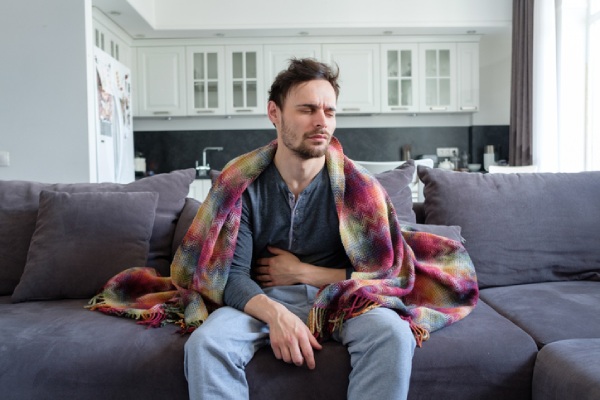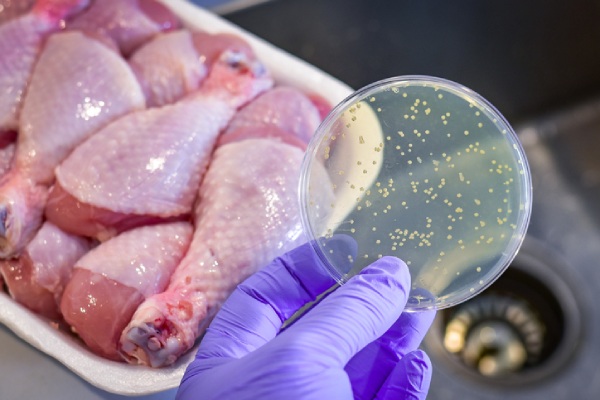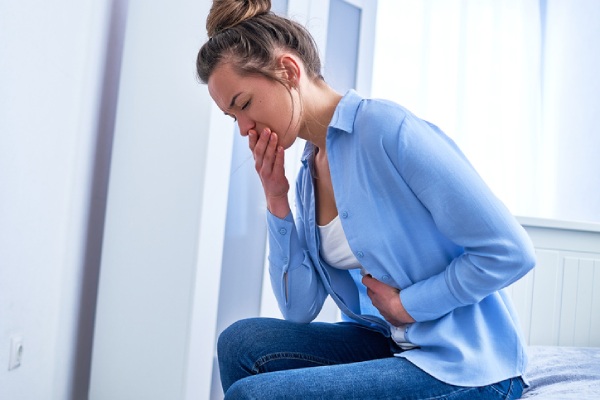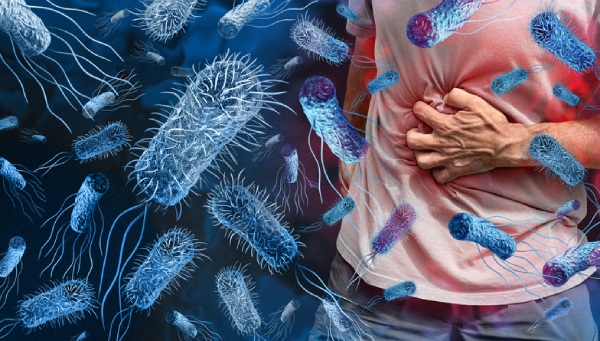Imagine enjoying a meal that tastes heavenly, only to find yourself rushing to the bathroom hours later, plagued by severe discomfort.
This scenario is all too common and can be attributed to food poisoning, a distressing condition that the Public Health Agency of Canada estimates affects upwards of 4 million Canadians annually.
Food poisoning, characterized by a range of symptoms from mild discomfort to life-threatening conditions, is caused by consuming contaminated food.
Understanding the signs and symptoms of food poisoning, along with its duration and treatment options, is crucial for managing this unpleasant experience effectively.
What Is Food Poisoning?
Food poisoning is an illness resulting from eating food contaminated with harmful pathogens, such as bacteria, viruses, and parasites.
These microorganisms or their toxins can cause symptoms ranging from mild to severe, affecting individuals differently based on their immune system strength and the type of contaminant ingested.
How Long Does Food Poisoning Last?
The duration of food poisoning can vary widely depending on the causative agent.
Symptoms can appear within hours of eating contaminated food or up to several weeks later, typically lasting from a few hours to several days.
In most cases, food poisoning is self-limiting, meaning it resolves without the need for medical intervention.
Food Poisoning Risk Factors – Who Can Come Down With It?
Anyone can get food poisoning, but certain groups are more at risk, including young children, the elderly, pregnant women, and individuals with weakened immune systems.
These groups should take extra precautions to avoid potentially contaminated food.

Food Poisoning Symptoms & Signs – Common vs. Life-Threatening
Food poisoning manifests through a spectrum of symptoms, influenced by the type of pathogen ingested, the amount consumed, and the individual’s immune response.
Understanding the distinction between common and severe symptoms is crucial for determining the appropriate course of action.
Common Symptoms of Food Poisoning
Common symptoms of food poisoning are uncomfortable but typically not life-threatening. They can often be managed with self-care measures at home. These symptoms include:
- Vomiting: An early defence mechanism to rid the body of toxins.
- Diarrhea: Frequent, loose stools that help eliminate harmful organisms from the gut.
- Nausea: A queasy feeling that may or may not lead to vomiting, often the first sign of trouble.
- Headache: This can accompany food poisoning, likely due to dehydration or the body’s overall response to infection.
- Fever: A mild fever may occur as the body fights off the infection.
- Abdominal Pain & Cramps: Pain in the stomach area, ranging from mild discomfort to sharp cramps, is common as the gastrointestinal tract reacts.
These symptoms usually appear within hours to a few days after consuming contaminated food and generally resolve on their own within 48 to 72 hours.
Staying hydrated, resting, and consuming bland foods can help manage these symptoms.
Life-Threatening Symptoms of Food Poisoning
In some cases, food poisoning can lead to severe complications that require immediate medical attention. These symptoms include:
- Blood in Vomit or Stool: Indicates severe irritation or damage to the gastrointestinal tract.
- Severe Dehydration: Symptoms include very dry mouth, intense thirst, little to no urination, dizziness, and confusion, as stated by Mayo Clinic. Dehydration is especially dangerous for young children and the elderly.
- High Fever: A fever above 101.5°F (38.6°C) can indicate a infection.
- Persistent Symptoms: Symptoms that last longer than three days without improvement may suggest a more serious condition.
- Neurological Symptoms: The World Health Organization explains some foodborne pathogens, such as Clostridium botulinum, can affect the nervous system, leading to symptoms such as blurred vision, muscle weakness, and tingling in the arms.
If you or someone you know experiences these severe symptoms, it’s crucial to seek medical care immediately.
Early intervention can prevent more serious outcomes and ensure a quicker recovery.

Causes of Food Poisoning – 3 Common Groups of Pathogens
Understanding the causes of food poisoning is crucial for prevention and treatment.
The Canadian Institute of Food Safety states Salmonella, E. coli, Listeria, Campylobacter, and Norovirus are among the most common culprits, with each of these fitting into one of three common groups of pathogens – bacteria, viruses, and parasites.
Food Poisoning Caused by Bacteria
Bacterial food poisoning is a prevalent issue worldwide, with certain bacteria being notorious for their ability to cause severe illness.
Salmonella, Campylobacter, E. coli, and Listeria are among the most common culprits, each associated with specific foods and conditions.
Salmonella and Campylobacter are often linked to poultry, and meat, but Salmonella can also be found in eggs and vegetables contaminated through soil or water, while Campylobacter can be found in shellfish.
- coli is commonly associated with undercooked beef and contaminated fresh produce.
Listeria, though less common, poses a significant risk in unpasteurized dairy products and ready-to-eat foods like deli meats and hot dogs.
These bacteria can contaminate food at any stage from farm to table, including during processing, handling, and storage, making it crucial to follow food safety practices diligently.
Food Poisoning Caused by Viruses
Viruses are another significant cause of foodborne illness, with norovirus and hepatitis A being the primary viral agents.
Norovirus, often dubbed the “stomach flu,” is highly contagious and can spread rapidly in crowded environments like cruise ships, schools, and nursing homes.
It is typically transmitted through contaminated food or water, or by direct contact with an infected person.
Hepatitis A, while less common, can lead to more severe health issues, including liver damage.
It is often associated with eating raw or undercooked shellfish from contaminated waters or foods handled by an infected person.
The viral nature of these illnesses means that good personal hygiene, especially proper handwashing, is essential in preventing their spread.
Food Poisoning Caused by Parasites
Parasitic infections, though less frequent than bacterial or viral causes, can lead to serious health complications.
Giardia and Toxoplasma are among the most concerning parasites that cause food poisoning.
Giardia is often spread through water contaminated with the parasite, making it a common issue in areas with poor sanitation. It can also be found in uncooked, contaminated food.
Toxoplasma, on the other hand, is typically associated with undercooked or raw meat, especially pork, lamb, and venison, and can also be found in cat feces.
Pregnant women and individuals with weakened immune systems are particularly at risk of severe illness from toxoplasmosis, the infection caused by Toxoplasma.
Avoiding contaminated water, properly cooking meat, and practicing good hygiene are crucial steps in preventing parasitic food poisoning.

Food Poisoning Diagnosis – How Your Doctor Can Diagnose It?
Diagnosing food poisoning involves a comprehensive approach where your doctor will ask about your recent food intake, symptoms, and the timeline of their onset.
To pinpoint the exact cause, stool or blood tests may be conducted to identify the specific pathogen responsible for the illness.
This step is crucial for determining the most effective treatment plan and preventing further spread of the infection.
Food Poisoning Treatments – How It Can Be Treated Properly?
1. Take Prescription Medications
For bacterial food poisoning, antibiotics may be prescribed if the infection is severe or if specific bacteria are identified that are known to respond well to such treatment.
It’s important to only take antibiotics when recommended by a healthcare provider to avoid unnecessary antibiotic resistance.
Other specific medications might also be prescribed based on the type of pathogen and symptoms presented.
2. Take OTC Medications
To manage symptoms like nausea and diarrhea, over-the-counter (OTC) medications can be effective.
PMS-Loperamide can help reduce the frequency of diarrhea, while Bismuth Subsalicylate is useful for treating nausea, heartburn, indigestion, upset stomach, and diarrhea.
These medications should be used with caution and under the guidance of your local pharmacist to ensure they are appropriate for your specific situation.
3. Stay Properly Hydrated
Dehydration is a significant risk with food poisoning due to vomiting and diarrhea. To counteract dehydration, it’s recommended to drink plenty of fluids.
Solutions like Pediatric Electrolyte and Gastrolyte are specially formulated to replenish fluids and electrolytes lost during illness, aiding in the recovery process.
4. Get Plenty of Rest
The body needs energy to fight off infections, and resting provides the necessary support for your immune system to combat the pathogens effectively.
Ensuring adequate rest helps speed up the recovery process by conserving energy that the body can use to heal.
5. In Severe Cases – Consider Medical Care!
Should symptoms persist or worsen, seeking medical care becomes imperative, especially for individuals who are at a higher risk of complications, such as the elderly, young children, pregnant women, and those with weakened immune systems.
Professional medical intervention may be necessary to prevent dehydration, address severe symptoms, and provide supportive care.
Recommended Things To Consume When You Have Food Poisoning
When grappling with food poisoning, choosing the right foods can significantly impact your recovery process.
Opting for gentle, easy-to-digest items can soothe your stomach. Here are some of the best options:
- Bananas
- Rice
- Toast
- Bland potatoes
- Boiled vegetables
- Sports drinks
These foods are gentle on the stomach and can help replenish lost nutrients and fluids.
Best Ways to Prevent Food Poisoning
Preventing food poisoning is key to maintaining good health and avoiding the discomfort and potential dangers associated with contaminated foods.
Here are some key tips to significantly lower your risk of falling ill from foodborne pathogens:
- Handle your food safely
- Avoid any food that may be unsafe
- Cook your food properly (meat & eggs)
- Wash your fruits and vegetables
- Properly seal and store your food
When To See a Doctor?
When should you see a doctor for your child?
Seek medical attention if your child shows signs of dehydration, persistent vomiting, or if symptoms are severe.
When Do Adults Need to See a Doctor?
Adults should consult a healthcare provider if they experience symptoms of severe dehydration, blood in vomit or stool, or if symptoms do not improve within a few days.

Talk To Your Local PharmaChoice Pharmacist About Food Poisoning Today
Food poisoning is an unpleasant experience that can be managed effectively with proper care and precautions.
By understanding the signs, symptoms, and treatments, you can navigate this condition more comfortably.
Remember, if you or a loved one is suffering from food poisoning, the team at PharmaChoice is here to help.
Visit your closest PharmaChoice pharmacy to consult with our healthcare providers and get the right food poisoning treatment today!



